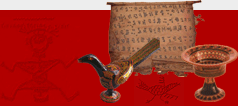|
保护传统于人心中
Human Psychology and the Preservation of Tradition
Vozkova, Nina 妮娜·沃兹科娃
Charles University of Prague, Czech Republic
捷克布拉格查尔斯大学
【摘要】对于凉山和诺苏人,保护其文化的各种可行的措施可以分为两套:一、保藏措施,撷取诺苏生活当中所有我们认为是属于传统文化的方面,并加快转换为能被保存或收藏的介质或形式。保藏是通过一系列研究和采集项目进行且完成的。该项目的结果将是传统物品的收藏、媒体的收藏即主要是口头传统及表演方式的保藏、研究彝族传统生活的专著论丛等。接下来的工作是对这些收藏品进行分类并加以更加精微的研究。很多年以来学者们已经在从事这种工作,但留下来的工作量仍是相当大的。二、转换措施:表示对文化的转换提供一定的援助,使之在现代社会条件下存在下去。在这方面我们还要继续探讨最合适的方法。第一条应该说是转换文化的重要部分。通过此方法传统文化的“记忆”被建立,使我们随时通过一定的方式重新找到它。同时保藏措施的工作支持本民族的学者可形成对自己文化有深入的了解和深厚的感情并且可以从现代人的角度看自己的文化的一组中坚分子。这个情况不应该仅仅是学者交流的第二级成果,而可以把它作为有指导的认为该民族的成员本身为文化的载体的一种过程。让该文化的成员对自己进行辨识并对周围世界做评判的一套传统知识、价值和信念可称为传统文化的核心。如果我们能够保存这些核心价值并使人们在转换的过程中携带过去,文化的外壳特征也许会在具备着这些价值的人的行为中重现。这有可能吗?这种过程真需要我们外来的协助吗?需要的话,我们能应用什么方式去协助?这样的援助是否会对自然社会转换带来外界影响的种种威险?许多人相信,胜得过潜在冒险的可能性和需要是存在的。我本人想介绍一些可行之路,均量其利弊。实际的行动应该基于筹备研究工作。成立实际工作的背景的一套知识当中有如下几项比较重要。一些方面可应用学者已经针对彝族的研究的比较丰富的成果。彝族文化作为现代中国和中华文化的组成部分;宗教及与之有关的毕摩现象;家庭、宗族及其在彝族当前生活中的作用;该民族的成员对自己的文化的认可,身份和感情问题。关于实际行动,我想多讲如下因素:可行的办法;该行动所该包括的不同人群及其作用和需要;试验的可行和作用;交际;合作,外来检验作用;培养和教育;冒险。目的是要把同该计划有关的各种想法作为系统化的一套思想排列出来,提出并强调其中的一些问题和因素,希望听者从中得到更加深入考虑的启发和鼓励。
关键词: 传统 文化转换 教育
Abstract
As we see the situation of Nuosu people in Liangshan,
different ways of protecting or saving the culture could
be possibly concentrated into these two means: 1) Preservation,Choosing
those aspects of the Nuosu life, which we consider as traditional
and transform them into shape, in which these can be conserved.
The preserving is accomplished through a program of research
and collection projects. The outcomes in this case are collections
of traditional objects, collections of media - conserving
first of all the oral tradition and the ways of performance
- , collections of studies on the traditional Yi life and
many others. Subsequent work consists of classifying of
these collections and studying them more profoundly. The
scholars have been doing this type of work for many years
already and still there is so much to be done. 2) Transformation:That
points to a possible assistance with the transformation
of the culture, which prevents the disappearance of the
tradition and would ideally lead to a situation when the
culture obtains the capability of continuation in a modern
society. In this case, we still need to keep looking for
the best way to proceed. The first option is and has been
an actually important step and part of the transformation
of the culture. First of all it builds the memory of the
culture and the possibility to come back to it in the future
in certain ways. As a secondary result it also helps to
form an elite group of scholars out of the members of the
culture, who then have a certain understanding and feeling
towards their own tradition and in the same time are able
to view it from the position of a modern person. This process
does not need to be only a secondary result of the communication
between the scholars, but it can be a directed process,
which considers the members of the culture as the main carriers
of the tradition. The core of the traditional culture is
set of traditional knowledge, values and beliefs, which
allows the members of the group to identify themselves and
judge the world around them. If we can preserve the core
values and let the people carry those throughout the process
of transformation, the outer signs of the culture might
possibly reappear as a result of the behavior of the people
who possess those values. Is this possible at all? Is there
really the need to assist with this kind of process? And
if yes, how can we do it? Wouldn’t it mean influencing the
natural process of the transformation of the society? There
are many people who believe that there are possibilities
and needs, which seem to be overgrowing the amount of possible
risks. I am trying to show some possible ways and to look
at the advantages as well as at the risks. Any real action
requires research, which would create the background for
future activities. And there are some preferred topics to
be part of the background. For some of them we actually
already have fruitful materials. the Yi culture as a part
of modern China and the “Zhonghua” culture ; the religion
and accordingly the Bimo phenomenon; the family and clan
and its role in the current lives of Yi people; the recognition
of the culture by its members, identity and emotions. Regarding
the activities that might possibly be conducted, I want
to see more closely some of following aspects: what are
the possible ways, who are the people involved, their roles
and needs, the role and possibility of experiment, communication,
cooperation and experience from outside, education, risks.
The aim is to put the ideas related to the topic on table
as systematized set of thoughts, point out and stress some
of them, which could hopefully inspire and encourage the
listeners to more profound consideration.
Keywords: tradition─culture transformation─education
作者简介:
妮娜·沃兹科娃,捷克人,出生于1978年4月20日。教育经历:2005年6月布拉格查理大学,预硕士毕业,专业:汉学,
毕业考题:中国历史、远东哲学、汉语 (现代汉语,古代汉语)、中国文学史。毕业论文:《勒俄特依——凉山彝族传统》(2000年至2003年西南民族学院,成都,关键词:现代彝语、彝族风俗习惯、彝族口头传统
(勒俄特依) )该论文在罗庆春教授支持下译为捷克文 (布拉格查理大学的学习休学);2000年3月布拉格查理大学本科生毕业;毕业考题:汉语、中国历史、中国文学;1998年–至1999年四川大学,
成都;专业:汉语(布拉格查理大学的学习休学)1997年起布拉格查理大学, 增加附助专业:民族学;1996年起布拉格查理大学,远东学系,专业:汉学。目前从事的项目:为捷克文学报翻译当代彝语诗歌;捷克国家民族博物馆:协助预备介绍中国西南方、越南和泰国少数民族文化展会。讲演:2003年11月5日“中国西南方山区民族”,布拉格,
国家艺术馆。2004年1月18日 应用彝族情况的例子介绍中国民族识别问题,布拉格,布拉格查理大学,远东学系。2004年4月28日诺苏苏尼和毕摩,布拉格,捷汉交际会。2005年1月28日中国西南诺苏文化:介绍四川彝族当代生活,维也纳,维也纳大学,东亚学系。旅游经验:
欧洲,1997年 : 伊朗, 巴基斯坦, 印度, 尼泊尔,中国(西藏,新疆,青海);1998 年: 外蒙古;1999年
– 2004年 中国 (四川, 云南, 贵州,甘肃)。
About the Author:
Nina Vozkova,Nationality: Czech;Born in 1978. Education:
June 2005 Charles University of Prague, expected to Graduate
M.A. degree of Sinology studies in exams of Chinese History,
Philosophy of Far East, Chinese language, modern and classical.
History of Chinese Literature. Thesis: Hnewo tepyy – the
tradition of Liangshan Yizu. 2000–2003: Southwest Institute
for Nationalities, Chengdu, majoring in Modern Yi Language,
Yi culture and customs, Oral tradition of Yi (Hnewo Tepyy)
and translation into Czech language, collective work with
Prof. Luo Qingchun (studies at Charles University interrupted);
March 2000, Charles University of Prague, graduated Bachelor
degree of Sinology studies in exams of 1) Chinese language;
2) Chinese history; 3) Chinese literature; 1998–1999: Sichuan
University, Chengdu, majoring in Chinese language (studies
at Charles University interrupted); since 1997, Charles
University of Prague, student of Ethnology in a program
of supplementary subject; since 1996, Charles university
of Prague, Institute of Far East Studies student of Sinology.
Currently working on: 1) Translation of modern Yi poems
for Czech Literature Newspapers;2) Exhibition of Minority
cultures of Southwest China, Vietnam and Thailand at the
National Ethnology Museum of Prague Lectures given: The
ethnic groups of mountains of Southwest China, Prague, National
Gallery (Nov. 5, 2003) ; Introduction to problems of classification
of Chinese minzu on the example of Yizu, Prague, Charles
University, Institute of Far East Studies (Jan. 18, 2004
); The Shamans and Priests of Nuosu society, Prague, The
Czech-Chinese Society (Apr. 28, 2004);The Nuosu Culture
of Southwest China: The contemporary life of Yi Ethnic Minority
in Sichuan, Vienna, The University of Vienna, Institute
for East Asian Studies (Jan. 28, 2005)。 Travel experiences:
Europe 1997 – Iran, Pakistan, India, Nepal, China ( Tibet,
Xinjiang, Qinghai);1998 – Mongolia;1999 – 2004 China (Sichuan,
Yunnan, Guizhou, Gansu)
|





